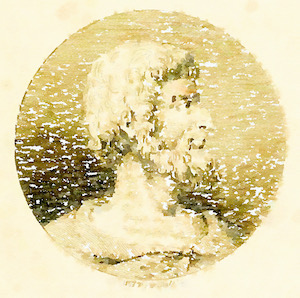
Greek poet, critic and scholar Callimachus (c. 305–240 BCE), born into a distinguished family in Cyrene in Libya, was the most representative poet of the Alexandrian school.
His family claimed links to the Battiad dynasty, which ruled Cyrenaica for eight generations. Members of his family included several Cyrenaic philosophers.
According to Diogenes Laertius, an ancestor named Anniceris ransomed Plato from the Syracusan tyrant Dionysius, so the family must have been wealthy and well-connected.
Other details of his life outside Cyrene and Alexandria are uncertain.
An Athenian inscription from around 247 BCE listing contributors to a special fund for the salvation of the city of Athens and defence of the countryside includes the name Callimachus, with an annotation suggesting the individual might have been a philosopher.
While the Callimachus in the inscription may not be the poet, "the area of Attica threatened . .. would have embraced much of the territory around Marathon and Rhamnous that had figured in the Hecale and 'every book of [the] . . . Aetia contained something about Attica'. The countryside which Callimachus' payment helped to defend was well known to him."
So, at some point towards the end of his life, Callimachus may have visited Athens and contributed two hundred drachmai to help defend territory featured in his work.
However, he seems to have spent most of his life in Alexandria, where he enjoyed the patronage of Ptolemy II Philadelphus and Ptolemy III Euergetes.
According to the Suda, a 10th-century Byzantine encyclopedia of the ancient world, he taught grammar in Eleusis, a small village near Alexandria, until Ptolemy II brought him to work at the Great Library; another Byzantine source suggests that he was "a youth of the court".
While he was never the head of the Great Library, he produced the Pinakes (Lists), an elaborate critical and biographical catalogue of the works held in the Library. It is the first known document to list, identify, and categorise a library's holdings. It also provided the foundation for later work on the history of ancient Greek literature.
By consulting the Pinakes, visitors to the Library patron could find out if the library contained a work by a particular author, how it was categorised, and where to find it. Callimachus did not seem to have any model for the Pinakes, so one assumes he invented this system independently.
Callimachus is among the most productive and influential scholar-poets of the Hellenistic age. He is best known for his short poems and epigrams, preferring brief, carefully formed and worded pieces to longer works modelled after Homer.
His firm stance against the epic reputedly placed him at odds with his student Apollonius of Rhodes, who wrote the Argonautica. A thirty-year feud in which the two traded barbed comments, insults, and personal attacks is said to have followed their falling out, which may not have initially stemmed from literary matters at all.
We know that Callimachus never occupied the head position at the library. Ptolemy II may have passed him over when the role went to Apollonius.
However, while Callimachus opposed "big books", the Suda lists a couple among eight hundred works.
However, of that total, only six hymns, sixty-four epigrams, and assorted fragments have survived. The fragments include a considerable portion of the Hecale, one of his few longer works treating epic material,
Another longer work, the Aitia (Causes), a four-book narrative elegy probably written around about 270 BCE, compiled tales from Greek mythology and history to explain the origin of obscure customs, festivals, ceremonies and similar matters. It also survives in fragments, as well as quotations in works by later writers.
Other works include the Iambi, thirteen short poems on everyday themes, the polemical Ibis, directed against Apollonius, as well as his Hymns and Epigrams.
Callimachus also produced elegies for special occasions, works in praising his royal patrons, prose and criticism.
Nineteenth- and twentieth-century discoveries of ancient papyruses confirm his fame and popularity. The only other Greek poet as widely quoted by the grammarians of the age is Homer, and he was taken as a model by many Roman poets, including Sextus Propertius, Ovid and Catullus.
He was "the most important poet of the Hellenistic age, because of his engagement with ideas about poetry, his wide-ranging generic experimentation, and his self-conscious stance as a poet between a performed art and the emerging possibilities of the text." (Brill's Companion to Callimachus; p. 11)
Sources:
Benjamin Acosta-Hughes, Luigi Lehnus and Susan Stephens (eds.), Brill's Companion to Callimachus,
Chambers Biographical Dictionary
Encyclopedia Britannica
Graham J. Oliver, Callimachus the Poet and Benefactor of the Athenians